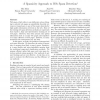Free Online Productivity Tools
i2Speak
i2Symbol
i2OCR
iTex2Img
iWeb2Print
iWeb2Shot
i2Type
iPdf2Split
iPdf2Merge
i2Bopomofo
i2Arabic
i2Style
i2Image
i2PDF
iLatex2Rtf
Sci2ools
116
click to vote
SDM
2008
SIAM
2008
SIAM
A Spamicity Approach to Web Spam Detection
Web spam, which refers to any deliberate actions bringing to selected web pages an unjustifiable favorable relevance or importance, is one of the major obstacles for high quality information retrieval on the web. Most of the existing web spam detection methods are supervised that require a large and representative training set of web pages. Moreover, they often assume some global information such as a large web graph and snapshots of a large collection of web pages. However, in many situations such assumptions may not hold. In this paper, we study the problem of unsupervised web spam detection. We introduce the notion of spamicity to measure how likely a page is spam. Spamicity is a more flexible and user-controllable measure than the traditional supervised classification methods. We propose efficient online link spam and term spam detection methods using spamicity. Our methods do not need training and are cost effective. A real data set is used to evaluate the effectiveness and the e...
Related Content
| Added | 30 Oct 2010 |
| Updated | 30 Oct 2010 |
| Type | Conference |
| Year | 2008 |
| Where | SDM |
| Authors | Bin Zhou 0002, Jian Pei, ZhaoHui Tang |
Comments (0)

